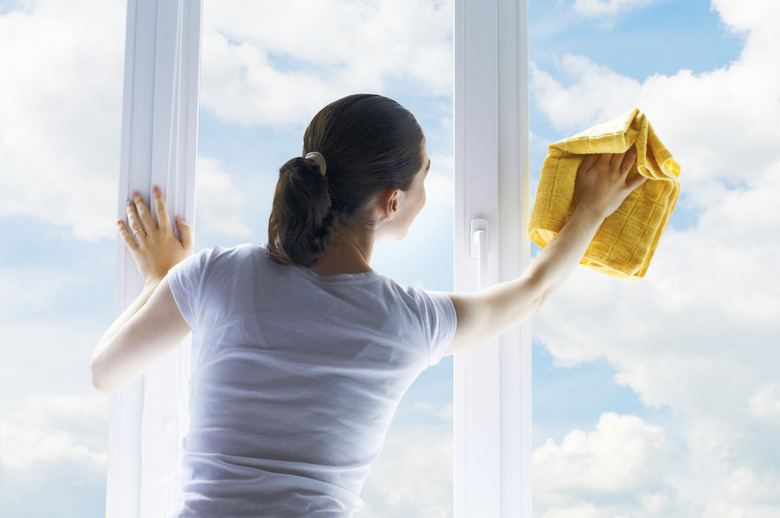How To Clean Glass With Rubbing Alcohol
Rubbing alcohol (also known as isopropyl alcohol) is a popular ingredient in DIY cleaning products because of its disinfecting properties. When you're cleaning windows, mirrors, and other glass surfaces, disinfecting isn't always a top priority since these aren't high-touch surfaces, like doorknobs and light switches, but rubbing alcohol can still be useful as part of an alcohol-based glass cleaner. It helps the cleaning solution evaporate quickly and creates a streak-free finish on glass.
Making Isopropyl Alcohol Window Cleaner
Isopropyl alcohol isn't great for cutting through visible dirt and grime, so an isopropyl alcohol glass cleaner needs to include an ingredient that will actually clean dirty glass surfaces. Using vinegar to clean windows is a nontoxic alternative to using commercial glass cleaner. A basic recipe for rubbing-alcohol-based glass cleaner uses one part rubbing alcohol, one part vinegar, and four parts water.
It doesn't matter whether you use 70 percent rubbing alcohol (70 parts alcohol and 30 parts water) or 99 percent rubbing alcohol (nearly pure alcohol) for your glass cleaner. The distinction is most important when you're using rubbing alcohol as a disinfectant. Contrary to what you might assume, 70 percent rubbing alcohol is more effective for disinfecting because its water content slows down evaporation and gives the alcohol more time to kill germs.
Always use a new spray bottle for any homemade cleaning products rather than repurposing an empty bottle left from some other spray product. You don't want to unintentionally mix chemicals with your alcohol-based glass cleaner.
Using Isopropyl Alcohol Window Cleaner
Once your glass cleaning solution is made, you're ready to make windows and mirrors sparkle. Spritz on the solution and let it sit for 10 seconds or so to give the alcohol time to kill germs and then use a clean microfiber cleaning cloth to wipe the surface. In a pinch, you can spray the solution directly on a paper towel and use that to clean a mirror or window, but the paper towel may leave behind some lint.
Be very careful to get the spray on the glass only and not on any stone countertops, nearby electronics, or other materials that could be damaged by acidic vinegar.
If you want to save leftover isopropyl alcohol window cleaner for future use, label the bottle clearly and store it out of the reach of kids and away from heat sources.
Cleaning Car Glass With Rubbing Alcohol
In addition to using alcohol to clean windows in your home, you can use alcohol to clean windows in your car — or more specifically, the inside of your car windows. Rubbing alcohol can help you achieve a streak-free finish inside your windshield and other car windows, which is important for visibility on sunny days. Simply dampen a clean microfiber cloth with rubbing alcohol and wipe down streaky windows.
Rubbing alcohol can also be used as a window de-icer on frosty mornings. Mix two parts rubbing alcohol and one part water in a spray bottle and spritz it directly on an icy windshield. Don't let the alcohol touch the car's paint.
Cleaning Eyeglass Lenses With Rubbing Alcohol
Eyeglass lenses aren't actually made of glass anymore, but people still wonder if they can use glass cleaners to clean eyeglasses. Rubbing alcohol may be used to disinfect dirty frames and to clean streaked lenses if the lenses haven't been treated with any special coatings. If they do have special coatings, wash eyeglasses with just dish soap and water. Until you can get an automatic lens cleaner at home, using soapy water is the easiest way to clean streaky lenses.
